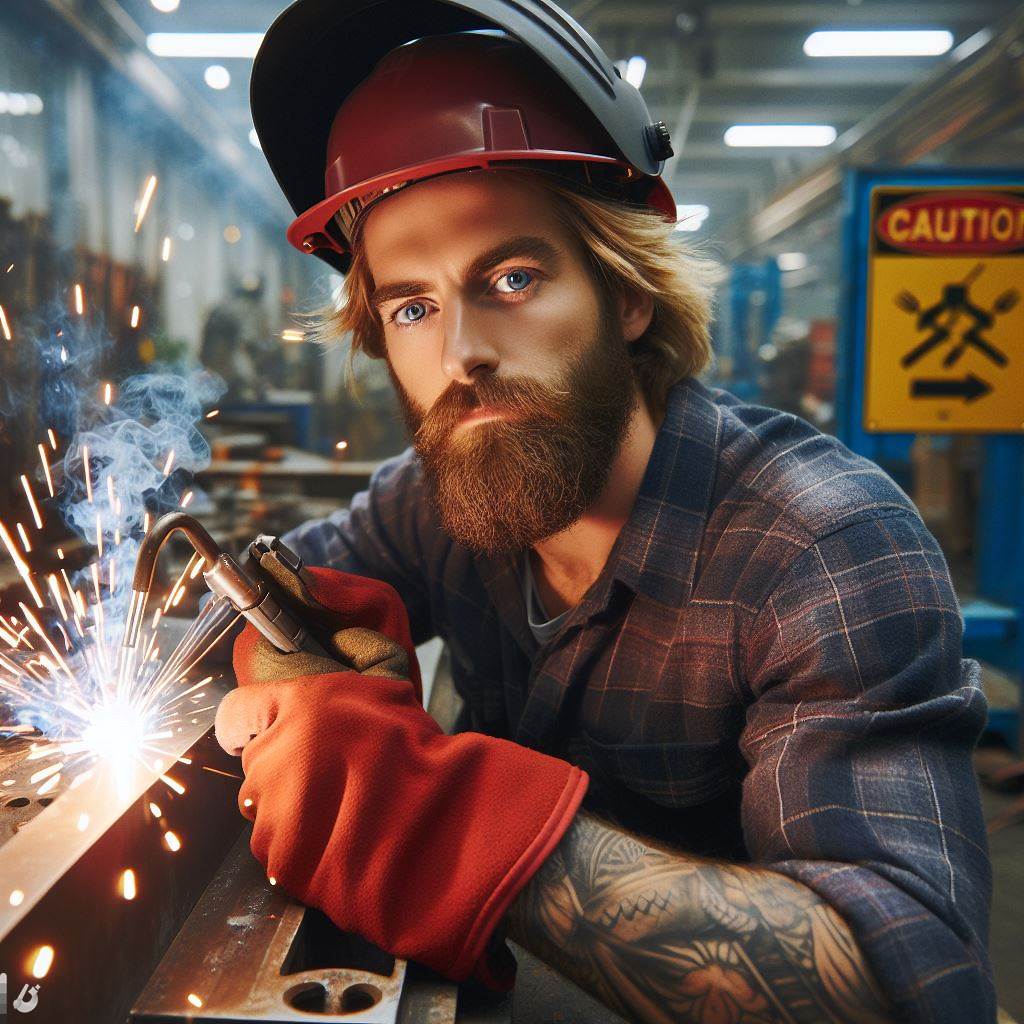The Future of Welding Jobs in Canada
Last Updated on December 31, 2023
Introduction
Welding jobs in Canada currently have a significant demand and play a crucial role in various industries.
Against the backdrop of Canada’s industrial landscape, the trajectory of welding jobs is poised for a compelling narrative.
The intersection of innovation, sustainability imperatives, and the relentless march of technology propels the welding profession into uncharted territories.
The purpose of this blog post is to explore the future prospects of welding jobs in Canada.
This exploration not only forecasts the demand for skilled welders but also delves into the evolving nature of job roles, reflecting the symbiosis between human expertise and automated precision.
As industries across Canada undergo a paradigm shift, welding professionals find themselves at the nexus of transformative change.
The increasing emphasis on green technologies and eco-friendly practices introduces a new dimension to welding jobs, necessitating adaptability and proficiency in sustainable welding techniques.
Moreover, the digital revolution has permeated the welding sphere, giving rise to smart welding processes and the integration of data analytics for precision and efficiency.
This analysis unravels the multifaceted aspects of the future welding landscape, shedding light on the educational pathways, certifications, and continuous learning required to stay at the forefront of this dynamic field.
From pipeline projects to aerospace advancements, the canvas of welding opportunities in Canada broadens, demanding not just technical mastery but also a keen understanding of industry dynamics and global trends.
Join us in this comprehensive journey as we navigate through the promising avenues and potential challenges shaping the future of welding jobs in Canada, offering a panoramic view of a profession that stands resilient in the face of change and promises a dynamic, rewarding career path for those ready to embrace the future.
Importance of Welding Jobs in Canada
Welding is a fundamental process that holds immense importance in various industries in Canada.
It is essential for constructing buildings, bridges, and infrastructure in the construction sector.
Moreover, welding is pivotal in the manufacturing industry, where it is used extensively for the production of metal products.
Additionally, the automotive industry relies on welding to assemble vehicles, ensuring their structural integrity and safety.
Furthermore, welding plays a vital role in the aerospace sector, as it is responsible for constructing aircraft parts and maintaining high safety standards.
Lastly, the oil and gas industry heavily depends on welding for the construction and maintenance of pipelines and refineries.
The significance of welding in various industries
The significance of welding jobs goes beyond the operational aspects of industries—they also make a considerable contribution to the Canadian economy.
Welding jobs create employment opportunities, providing livelihoods for numerous skilled professionals.
The demand for skilled welding workers ensures a steady supply of labor, facilitating economic growth.
Furthermore, the efficient functioning of various industries, facilitated by welding, enhances productivity and competitiveness in the market.
The contribution of welding to the Canadian economy
Welding also has a direct impact on Canada’s international trade and economic prosperity.
The export of welding services and products allows the country to leverage its expertise in the global market.
By meeting the welding needs of other countries, Canada can generate valuable revenue streams.
Additionally, developing a strong welding industry fosters innovation and attracts investments, further boosting economic development.
In short, welding plays a significant role in various industries in Canada.
Its importance extends to sectors such as construction, manufacturing, automotive, aerospace, and oil and gas.
Welding contributes to the Canadian economy by creating employment opportunities, ensuring a steady workforce, and facilitating productivity and competitiveness.
Moreover, the export of welding services and products strengthens international trade and stimulates economic growth.
As Canada continues to invest in technology and training for welding professionals, the future of welding jobs in the country looks promising.
Read: Welding Certifications in Canada: What You Need
Technological Advancements in Welding
Overview of the latest technologies in welding
- Laser welding: Utilizes a high-intensity laser beam to join materials together with precision.
- Friction stir welding: Creates strong joints by frictional heating and mechanical agitation.
- Plasma arc welding: Uses a concentrated plasma arc to melt and join materials.
- Electron beam welding: Focuses a beam of high-velocity electrons to create precise and deep welds.
- 3D printing or additive manufacturing: Builds objects by adding layers of material, revolutionizing fabrication processes.
Impact of automation and robotics on welding jobs
- Increased efficiency and productivity: Robots can work non-stop without fatigue, offering higher output rates.
- Improved accuracy and consistency: Automation ensures repetitive tasks are performed with consistent quality.
- Enhanced worker safety: Robots can handle hazardous conditions, reducing the risk of accidents to human welders.
- Reduction in labor costs: Automation decreases the need for manual labor, leading to cost savings for companies.
How advancements may change the nature of welding jobs in the future
- Shift from hands-on to supervisory roles: With automation, welders may transition to overseeing robotic operations.
- Demand for skilled technicians: As technology evolves, the need for individuals proficient in operating and maintaining robotic systems will increase.
- Emphasis on programming and problem-solving skills: Welders may require knowledge of robotics, software, and troubleshooting to adapt to the changing landscape.
- Integration with other technologies: Welding may be combined with artificial intelligence and machine learning to optimize processes further.
- Increased customization possibilities: Advanced techniques allow for intricate designs and complex component manufacturing.
- Addressing the skills gap: As automation becomes prevalent, training programs and certifications must evolve to meet industry demands.
In fact, technological advancements in welding are reshaping the industry, offering benefits such as improved efficiency, accuracy, and safety.
While automation and robotics may replace some manual welding jobs, they also create opportunities for skilled technicians and innovation.
Adapting to these changes will require welders to embrace new skills and stay updated with evolving technologies to remain competitive in the future job market.
Read: Understanding Different Welding Techniques
Skills and Training Required for Future Welding Jobs
Key skills necessary for welders to thrive in the future job market
- Technical proficiency in various welding techniques, including TIG, MIG, and ARC welding.
- Ability to read and interpret blueprints, specifications, and welding codes.
- Strong knowledge of metallurgy, material properties, and welding procedures.
- Excellent hand-eye coordination and manual dexterity for precise and accurate work.
- Attention to detail to ensure welds meet industry standards and specifications.
- Problem-solving abilities to troubleshoot and resolve welding-related issues.
- Strong understanding of safety protocols and measures to prevent accidents.
- Adaptability to work with new technologies and equipment used in modern welding.
- Effective communication skills to collaborate with team members and understand client needs.
Importance of ongoing training and upskilling:
- Keep up with advancements: Continuous learning is essential to stay updated with evolving welding technologies, techniques, and materials.
- Enhanced employability: Employers prefer individuals who show a commitment to improving their skills and knowledge through ongoing training.
- Better job prospects: Welders with diverse skill sets and the ability to work with advanced equipment have a competitive edge in the job market.
- Adapt to industry changes: Ongoing training allows welders to adapt and meet the changing demands and requirements of the industry.
- Improved productivity and efficiency: Continuous learning helps welders develop efficient techniques, reducing production times and improving overall productivity.
- Ensure safety and quality: Regular training enables welders to stay updated on safety protocols, reducing the risk of accidents and ensuring high-quality work.
- Expand career opportunities: Upskilling opens doors to specialized welding roles, such as underwater welding or robotics welding.
- Stay ahead of automation: With the rise of automation, ongoing training helps welders develop skills to work alongside robots and remain valuable in the workforce.
- Professional growth and personal satisfaction: Continuous training allows welders to advance in their careers, gain recognition, and take pride in their work.
In essence, the future of welding jobs in Canada relies heavily on welders acquiring the necessary skills and undergoing regular training.
The key skills mentioned above ensure welders can thrive in the ever-evolving job market.
Ongoing training and upskilling play a crucial role in adapting to industry changes, improving employability, and maintaining safety and quality standards.
As automation continues to shape the industry, welders must focus on acquiring new skills to remain competitive and secure their place in the job market.
Read: Creating a Pollinator Garden in Canada
Emerging Industries and Opportunities for Welders
Industries Expected to Drive Demand for Welders in the Future
- Automotive Industry: The automotive sector is constantly evolving, requiring skilled welders to ensure quality and safety.
- Aerospace Industry: As the demand for air travel increases, the need for skilled welders in aerospace manufacturing grows.
- Renewable Energy Industry: With the emphasis on sustainable energy sources, welders will be essential in building wind turbines, solar panels, and other renewable energy infrastructure.
- Construction Industry: Welders will continue to be in demand for construction projects, including the fabrication of steel structures and the installation of pipelines.
- Oil and Gas Industry: The maintenance and expansion of pipelines, oil rigs, and refineries will require skilled welders to perform various welding tasks.
Potential Job Opportunities in Emerging Industries
- Automotive Industry: With advancements in electric vehicles, welders will be needed to join different materials used in their construction.
- Aerospace Industry: Job opportunities for welders can include working in spacecraft assembly or manufacturing components for airplanes.
- Renewable Energy Industry: Welders may find employment in manufacturing and installing wind turbine components or solar panel frameworks.
- Construction Industry: Welders will have job prospects in welding steel structures, installing pipelines, and fabricating architectural features for buildings.
- Oil and Gas Industry: Welding positions will be available in constructing and maintaining pipelines, oil rigs, and refineries.
Industries Expected to Drive Demand for Welders in the Future
Welding jobs in Canada have a promising future, driven by emerging industries that require skilled welders to meet their demands.
The automotive industry, constantly evolving with technological advancements, relies on welders for ensuring the quality and safety of vehicles.
As electric vehicles gain popularity, welders will play a crucial role in joining different materials used in their construction.
Potential Job Opportunities in Emerging Industries
Another industry that offers significant opportunities for welders is the aerospace sector.
With the increasing demand for air travel, aerospace manufacturing requires skilled welders for projects such as spacecraft assembly and manufacturing components for airplanes.
The precision and quality of welds are essential in ensuring the safety and durability of these vital transportation means.
The renewable energy industry, focusing on sustainable energy sources, presents a promising field for welders.
Manufacturing wind turbines, solar panels, and other renewable energy infrastructure involves effective welding techniques to ensure structural integrity.
Welders will be responsible for joining and fabricating crucial components, contributing to the growth of this industry.
The construction industry also remains a reliable source of job opportunities for welders.
Welders are integral to this industry, involved in fabricating steel structures, installing pipelines, and constructing architectural features of buildings.
Their skills are necessary for maintaining the overall structural integrity and safety of various construction projects.
The oil and gas industry, although facing challenges, still relies on welders for maintenance and expansion.
Welders perform critical tasks in constructing and maintaining pipelines, oil rigs, and refineries.
The demanding nature of this industry requires highly skilled welders to ensure the safety and efficiency of operations.
As these emerging industries continue to advance and expand, the demand for skilled welders will only increase.
Welders should seize these opportunities by staying updated with the latest welding techniques and technologies.
Remaining adaptable and continuously developing their skills will ensure their relevance and competitiveness in the job market.
For individuals looking for stable and rewarding careers, welding in Canada presents a promising future with diverse industry options.
Read: Rock Gardens: A Canadian Landscaping Trend

Challenges and Potential Solutions
The challenges that might arise in the future of welding jobs
- Lack of skilled welders due to an aging workforce and limited apprenticeship opportunities.
- Advancements in automation and robotics may reduce the demand for manual welders.
- Increasing competition from low-cost countries may affect job opportunities in Canada.
- Technological advancements require welders to constantly update their skills and embrace new technologies.
- Health and safety concerns, including exposure to toxic fumes and radiation, pose risks for welders.
Potential solutions and strategies to overcome these challenges
- Addressing the shortage of skilled welders: Increase funding for apprenticeship programs and promote trades education to attract more young individuals to pursue welding as a career.
- Embracing automation and robotics: Encourage welders to acquire skills in programming and operating automated welding systems, enabling them to work alongside machines and enhance productivity.
- Focusing on niche markets: Develop specialization programs, such as underwater welding or aerospace welding, to create new job opportunities that aren’t easily outsourced.
- Continuous skills development: Establish partnerships between welding schools and industry to ensure that the curriculum aligns with technological advancements and provides hands-on training with the latest equipment.
- Prioritizing health and safety: Implement strict regulations and safety protocols to safeguard welders’ well-being, including proper ventilation systems and mandatory use of personal protective equipment.
- Collaboration with other industries: Foster partnerships with industries that require welding services, such as construction or automotive, to create a steady demand for skilled welders.
- Encouraging innovation: Invest in research and development to drive innovation in welding technologies and techniques, making Canadian welders globally competitive.
- Promoting entrepreneurship: Provide support and resources for welders to start their own businesses, creating job opportunities and promoting economic growth.
In a nutshell, the future of welding jobs in Canada presents both challenges and opportunities.
Addressing the shortage of skilled welders, embracing automation, exploring niche markets, focusing on continuous skills development, ensuring health and safety, collaborating with other industries, encouraging innovation, and promoting entrepreneurship can help overcome these challenges.
By implementing these potential solutions and strategies, Canada can secure a strong position in the welding industry and provide sustainable employment opportunities for its workforce.
Government Initiatives and Policies
Government efforts to support the welding industry in Canada
- Funding for research and development in welding technologies to enhance efficiency and productivity.
- Implementation of programs to promote the recruitment and training of skilled welding professionals.
- Provision of grants and subsidies for businesses to invest in advanced welding equipment and technologies.
- Collaboration with industry stakeholders to identify and address challenges faced by the welding sector.
- Development of initiatives to promote the use of welding in innovative industries like aerospace and robotics.
- Creation of partnerships with educational institutions to offer welding programs and apprenticeships.
Impact of policies related to immigration and apprenticeships on the future of welding jobs
- Immigration policies that prioritize skilled workers in welding address the shortage of qualified welders in Canada.
- Increased intake of skilled foreign welders through immigration programs can contribute to the growth of the industry.
- Provision of pathways for international welders to obtain permanent residency enhances stability and long-term commitment.
- Apprenticeship programs in welding provide opportunities for individuals to gain practical skills and enter the workforce.
- Government support for apprenticeships encourages individuals to consider welding as a viable career option.
- Implementation of regulations to enforce training and certification standards ensures quality workmanship and contributes to job security.
Government efforts to support the welding industry in Canada
While the government’s efforts to support the welding industry in Canada are commendable, further action is necessary to address evolving challenges.
Investing in research and development can result in the adoption of new welding technologies, making the industry more competitive globally.
Moreover, collaboration with industry stakeholders should extend to the identification of future skills required in welding, such as automation and digitalization expertise.
By anticipating these changes, the government can proactively adapt policies to meet the evolving needs of the industry.
Impact of policies related to immigration and apprenticeships on the future of welding jobs
The impact of policies related to immigration and apprenticeships on welding jobs in Canada is significant.
Immigration policies that prioritize skilled migration in welding can help alleviate the shortage of qualified professionals in the domestic labor market.
This can lead to job creation and economic growth in the welding industry.
Furthermore, providing pathways for international welders to obtain permanent residency fosters stability and encourages a long-term commitment to the field.
Apprenticeship programs play a crucial role in nurturing skilled welders.
By offering hands-on training and real-world experience, apprenticeships provide individuals with the necessary skills to excel in the field.
Government support for apprenticeships, through funding and collaboration with industry partners, can attract more individuals to pursue a career in welding.
This will not only address the existing shortage of welders but also ensure a steady supply of skilled professionals for the future.
The implementation of regulations to enforce training and certification standards is essential for both job quality and security.
Certified welders are more likely to find employment opportunities and enjoy higher wages.
By upholding industry standards, the government can safeguard the reputation of Canadian welding professionals, ensuring their competitiveness in the global market.
In summary, the Canadian government has implemented various initiatives and policies to support the welding industry.
Efforts to enhance research and development, promote apprenticeships, and address immigration challenges have a positive impact on the future of welding jobs in Canada.
However, continuous collaboration and adaptation of policies are necessary to address emerging challenges and ensure the industry’s long-term growth and sustainability.
Conclusion
Throughout this blog post, we have discussed the future of welding jobs in Canada.
We have highlighted the rising demand for skilled welders due to various industries’ growth.
We have also discussed the advancements in technology and how they are transforming the welding industry.
Additionally, we have touched on the importance of continuous learning and adaptability for welders to stay competitive in the evolving job market.
The future of welding jobs in Canada appears promising.
With the increasing demand for skilled welders and the constant technological advancements, there will be ample opportunities for individuals pursuing a career in welding.
With proper training and continuous learning, welders can stay ahead in this evolving industry and secure stable employment.
It is essential for aspiring welders to invest in their skills and stay updated with the latest welding techniques and technologies.
By embracing new advancements like automation and robotics, welders can enhance their job prospects and contribute to a more efficient and productive welding industry in Canada.
As industries such as aerospace, automotive, construction, and infrastructure continue to grow, the need for skilled welders will remain high.
Welding professionals can explore various sectors, take on diverse projects, and enjoy a fulfilling and rewarding career.
Overall, while the welding industry may face challenges, the future of welding jobs in Canada is bright with opportunities for growth, advancement, and job security for those willing to adapt to the evolving demands of the industry.


